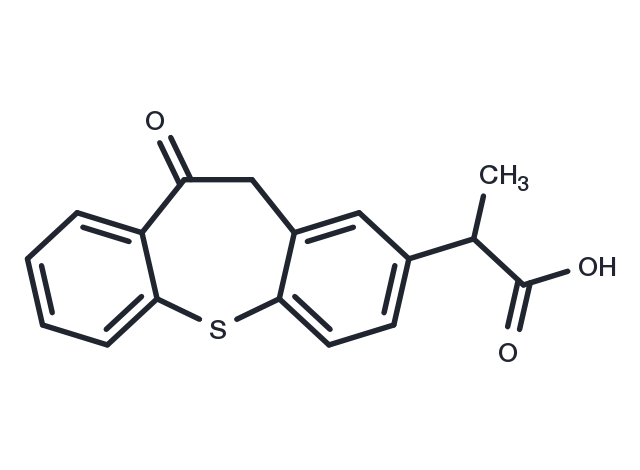Powder: -20°C for 3 years | In solvent: -80°C for 1 year
Zaltoprofen (Soleton) 是一种非甾体类抗炎剂,具有强大的抗炎作用和对炎性疼痛的止痛作用。它是可口服的COX-2抑制剂,对COX-1和COX-2的IC50值分别为 1.3 和 0.34 μM。

| 规格 | 价格/CNY | 货期 | 数量 | |
|---|---|---|---|---|
| 2 mg | ¥ 258 | 现货 | ||
| 5 mg | ¥ 412 | 现货 | ||
| 10 mg | ¥ 632 | 现货 | ||
| 25 mg | ¥ 962 | 现货 | ||
| 50 mg | ¥ 1,210 | 现货 | ||
| 100 mg | ¥ 1,790 | 现货 | ||
| 200 mg | ¥ 2,680 | 现货 | ||
| 500 mg | ¥ 4,460 | 现货 | ||
| 1 mL * 10 mM (in DMSO) | ¥ 561 | 现货 | ||
| 产品描述 | Zaltoprofen (Soleton) is a Cox-1 and Cox-2 inhibitor, which is used for the treatment of arthritis. |
| 靶点活性 | COX-2:0.34 μM (IC50), COX-1:1.3 μM (IC50) |
| 体外活性 | Zaltoprofe is a non-steroidal anti-inflammatory drug (NSAID) that effectively inhibits cyclooxygenase-2 with minimal side effects on the gastrointestinal tract. Zaltoprofe binds to a specific site of the bradykinin B2 receptor protein, therefore, the effect of Zaltoprofen on the bradykinin-evoked response of adult DRG neurons can be investigated to investigate possible interaction sites. Zaltoprofen is the most effective inhibitor of bradykinin enhancing capsaicin-induced Ca2+ uptake into DRG neurons. Zaltoprofen also significantly inhibits bradykinin-induced 12-lipoxygenase (12-LOX) activity and slow bradykinin-induced release of the substance P from DRG neurons. Zaltoprofe showed a potent analgesic effect on BK (i.pl.)-induced hyperalgesia at 1 nmol, whereas loxoprofen or its active metabolite loxoprofen-SRS did not. Zaltoprofe also inhibits [Tyr8]-BK-induced nociception in that it is a type B2 receptor specific agonist; but does not affect the nociception induced by [lysine-DES-Arg9]-BK, which is type B1 BK receptor specific agonist. In primary sensory neurons, Zaltoprofe produces an analgesic effect of a bradykinin-induced nociceptive response by blocking the B(2) receptor-mediated pathway. Zaltoprofe completely inhibits Ca2+ increase induced by bradykinin, which is inhibited by the B(2) antagonist D-Arg-[Hyp(3), Thi(5,8), D-Phe(7)]-bradykinin, but not B(1) Antagonist. |
| 体内活性 | After 8 hours of ConA treatment, mice were administrated of Zaltoprofen(10 mg/kg) resulting in inhibition of ConA-induced body weight loss. The combination of 10 mg/kg Zaltoprofen and ConA resulted in a 4-fold increase in food intake in mice compared to ConA only. Therefore, Zaltoprofen increased weight loss in ConA-treated mice. |
| 别名 | CN100, 扎托布洛芬, Soleton |
| 分子量 | 298.36 |
| 分子式 | C17H14O3S |
| CAS No. | 74711-43-6 |
Powder: -20°C for 3 years | In solvent: -80°C for 1 year
Ethanol: 29 mg/mL (97.2 mM)
DMSO: 56 mg/mL (187.7 mM)
H2O: < 1 mg/mL (insoluble or slightly soluble)
| 可选溶剂 | 浓度 体积 质量 | 1 mg | 5 mg | 10 mg | 25 mg |
| Ethanol / DMSO | 1 mM | 3.3517 mL | 16.7583 mL | 33.5166 mL | 83.7914 mL |
| 5 mM | 0.6703 mL | 3.3517 mL | 6.7033 mL | 16.7583 mL | |
| 10 mM | 0.3352 mL | 1.6758 mL | 3.3517 mL | 8.3791 mL | |
| 20 mM | 0.1676 mL | 0.8379 mL | 1.6758 mL | 4.1896 mL | |
| 50 mM | 0.067 mL | 0.3352 mL | 0.6703 mL | 1.6758 mL | |
| DMSO | 100 mM | 0.0335 mL | 0.1676 mL | 0.3352 mL | 0.8379 mL |
对于不同动物的给药剂量换算,您也可以参考 更多...
请在以下方框中输入您的动物实验信息后点击计算,可以得到母液配置方法和体内配方的制备方法: 比如您的给药剂量是10 mg/kg,每只动物体重20 g,给药体积100 μL,一共给药动物10 只,您使用的配方为5% DMSO+30% PEG300+5% Tween 80+60% ddH2O。那么您的工作液浓度为2 mg/mL。
母液配置方法:2 mg 药物溶于 50 μL DMSO (母液浓度为 40 mg/mL), 如您需要配置的浓度超过该产品的溶解度,请先与我们联系。
体内配方的制备方法:取 50 μL DMSO 主液,加入 300 μL PEG300, 混匀澄清,再加 50 μL Tween 80,混匀澄清,再加 600 μL ddH2O, 混匀澄清。
您可能有的问题的答案可以在抑制剂处理说明中找到,包括如何准备库存溶液,如何存储产品,以及基于细胞的分析和动物实验需要特别注意的问题。
Zaltoprofen 74711-43-6 Immunology/Inflammation Neuroscience COX anti-inflammatory CN-100 COX-2 inhibit non-steroidal Inhibitor NSAID COX-1 CN100 扎托布洛芬 Cyclooxygenase analgesic CN 100 Soleton inhibitor
